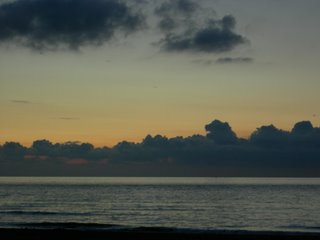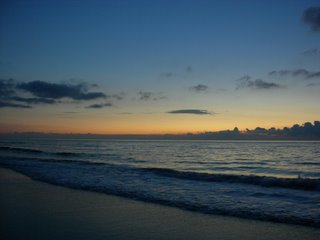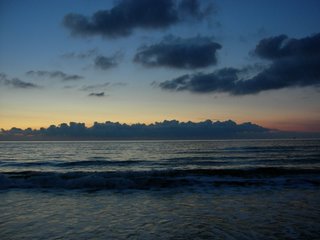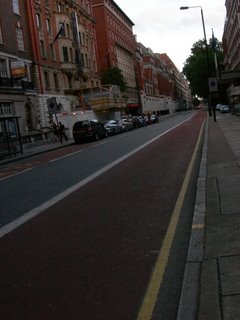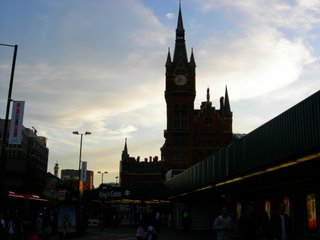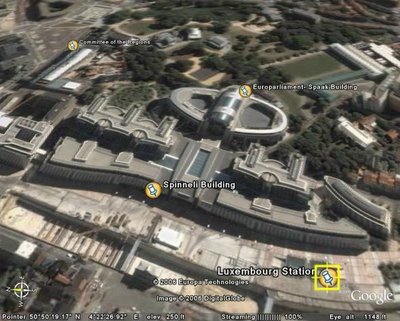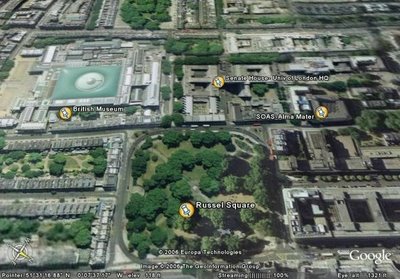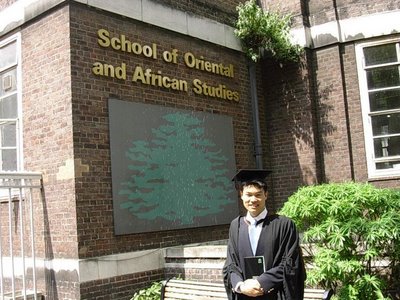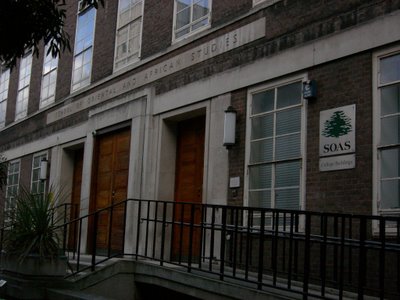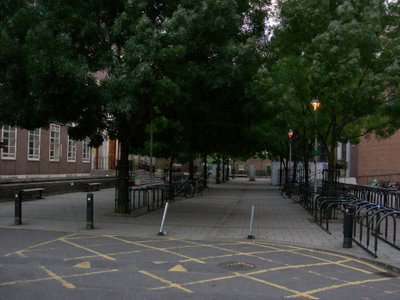Came home, and my little cat greeted me with her tail up and head rubbing against my legs as soon as I got upstairs. I was drenched, from walking around in the pouring rain the entire day. Some drops from London, some from Brussels, some from just outside—all raindrops nonetheless. Kitty didn’t seem to mind the fact I was dripping wet, and was happy to see me. I realised then how much I missed her.
It’s been a long couple of days, and a good change from being home the whole day. Again, like the other times when I travel, I felt so free and relaxed, as if the world lay out there for me to explore, and explore I could as far as my feet and tireless mind could carry me. It was a nostalgic trip more than anything, so a bit more blue than I had expected. I guess when you visit people and places from the past you tend to remember things that have been or could have been. And then all these thoughts of regret, sweet memories, silent flashbacks, replayed dialogues return to make you realise how long ago all that was… and how much older you’ve become.
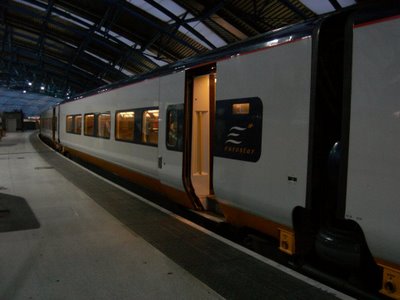 (Eurostar)18082006
(Eurostar)18082006
I actually got to the railway station on Friday just in time to see the train arrive. Had I been a minute later I would’ve never made it. I got on the train, sat down and panted. Relieved, thankful and a little bit of anxiety still lingering had I been just a few moments late. As the train pulled away and gained speed towards Brussels, I laid back into my seat and watched the flat Dutch landscape roll by.
Checking in at the Eurostar terminal was a breeze. There were no long ques and no more stringent measures because of the heightened security alert. I was worried my bottle of water and orange juice, and supply of lotions and fragrance would be mistaken for potentially deadly devices. But nobody said a thing. Checking my ID took less than 10 seconds. The customs guy glanced at the card and at me, smiling, and then went on to wish me a good day. Some two hours later, at times traveling at 300km/hr, and across the English Channel, I was in London. To my surprise there was no passport control, and passengers just poured out of the terminal at Waterloo with ease while heavily armed police stood and watched. Maybe terrorists don’t like trains.
Met up with the friend I stayed with the next couple of days in London. We met in the last year of uni, and got pretty close soon enough.[...] He’s from Ireland, and I just love the way he speaks, both in the accent and the way he uses words. [...] For many months I helped him with his Chinese studies, since he’s a little disabled and dyslexic. Tutoring mostly, and also going along to his lectures to take notes for him. It was a test of patience sometimes, as he could be very bossy and sometimes didn’t really bother with the studies. But I got paid by the uni for being an assistant, well, so I didn’t mind too much. That meant on top of my own ‘heavy’ hours in the final year, I had to attend his classes too. A total of around 20hrs of lectures a week… Now, compared to the 10 or less hours of lectures I had in previous years that’s stressful!
I met him and his fiancé at the station. [...] They both met at a meeting of
SGI, a branch of Japanese Buddhism which does a lot of chanting and praying. Their upcoming wedding in November will be a Buddhist one, and I was actually asked to be the best man. For the moment I didn’t say for sure if I could attend. I felt I didn’t really have what it takes to be best man, but then again I really have no idea what it takes. He said there’s no one else better for role, but I still feel a little uncomfortable.
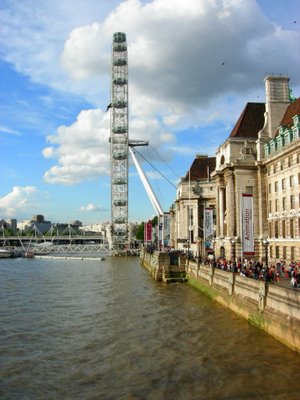 (London Eye)
(London Eye)Anyways, dropped off my stuff at their little apartment just off of Waterloo station. Had some traditional English ‘afternoon tea’, and met their fat cat. She’s really huge, unlike my own. And the times I was there she never seemed to budge from the place she occupied on my friend’s bed. The only time she walks up is to get food, or to terrorise you by walking on your pillow just as you’re trying to sleep. And when she walks her belly is big and flabby it hangs to the ground. Her purr is really loud and wheezy like an out-of-tune machine. For the nights I spent at their place I sometimes fell asleep and woke up with her tail brushing against my face, and her loud, incessant purring.
Within an hour of arriving we were out and about, armed with three digital cameras and my memories of places I’d like to visit and see again. Walked down the Thames towards London Eye (giant merry-go-around also known as the Millennium Wheel), Houses of Parliament, Whitehall (where many government offices and ministries are located), Trafalgar Square, Piccadilly Circus, Oxford Street (main shopping in central London), then onto King’s Cross station to pick up my tickets for the trip down south to the wedding the next day.
It took some time to get used to the crowd and noise that describes and consumes London. I guess when I left the city two years ago, I also left behind what it was like—all that traffic, chaos, constant buzzing and din, the hordes of tourists and people rushing around, so many things and events taking place at a fast pace that can leave you out of breath just watching it all go by. And waling on the ‘wrong’ (right) side of the road didn’t help if you had to push your way through, against the flow of the crowd. I felt so disorientated and a little dizzy and unwell, plus perhaps the fact that I had just made a long trip to get to London. Everything was happening so fast, and I was walking around like a little boy from the countryside seeing everything for the first time. Though it wasn’t the first time. And that made it feel all the more disorienting.
I guess all the landmarks are still there, still standing, still glorious and beautiful in their special ways. Though undoubtedly countless eyes and cameras have captured them in the past two years since I was last in London. And many more events and changes have taken place in the country, in the city that it’s impossible to recount them all, let alone imagine. It’s a funny feeling, really. Like every corner I turn, there seem to be so many memories that return, saddled with voices and faces of those I shared with, all waiting for me around every corner, all waiting for the next step I take on this journey down memory lane.
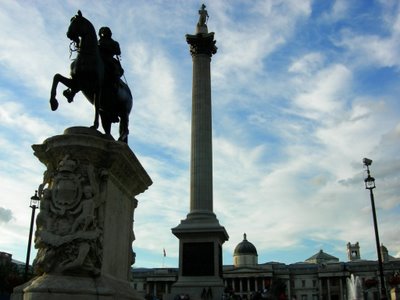 (Trafalgar Square, Nelson's Column)
(Trafalgar Square, Nelson's Column)That evening I went for a stroll down the river, as I would do again a day or two later by myself. It’s so quietly romantic, with all those dazzling lights and rippling water. This is the one thing I really miss about London. I used to walk down the river along the south bank and thoroughly enjoy the quiet yet buzzing calm along the way, which is dotted with traditional pubs and the occasional street artist, not to mention homeless people with placards trying to show in so many words how hungry and whatever ills have befallen them in a lonesome attempt to squeeze pity and few pennies from passerbys. [...]
From this side of the river, you can capture the old, the modern, the chic and the derelict London all mingled together before you. The bright lights of The City (banking and financial district) glows in the darkness, almost brimming and humming with the sounds of money and stock transactions even at night. St. Paul’s Cathedral and its gigantic dome towers over the city, trying to compete for space with the mushrooming skyscrapers, only managing to distinguish itself by its pure whiteness and medieval architectural style, or otherwise would have all too easily been swallowed whole into the backdrop of the urban sprawl of concrete, steel and glass.
Now and then barges and sightseeing boats sail along beside you, flashes of light appearing from inside their darkened cabins, as yet another tourist captures memories and scenes to treasure one day when he is far, far away. And then there are the bridges, some rumbling like a low cloud of thunder as trains roll on it and pull into the many stations along the river. Others flash with red and white lights as cars and double-decker buses speed across them, from one side of the river to the other.
Shakespeare’s Globe, Tate Modern, London City Hall, Southwark Cathedral, the Tower Bridge, and in the distance three glistening towers in the Docklands…they all stand there, some after centuries, some just for a decade, others for even less of a period, but all proud to be part of the scene, part of the vibrance and life that embodies this great city. From the quiet of the river bank, you can see London, in all its shapes and sizes, in all its history and glory. You can feel and see it pulsate and wane before your eyes, and get closer to understanding why this is one of the greatest cities in the world.
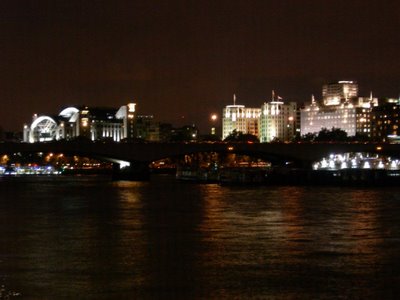 (View across the Thames, Charing Cross station)
(View across the Thames, Charing Cross station)
"When a man is tired of London, he is tired of life”
Samuel Johnson

Please visit the following links to my travellog for more exciting pictures!
